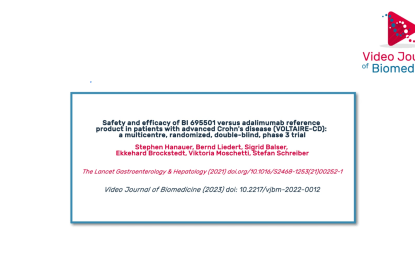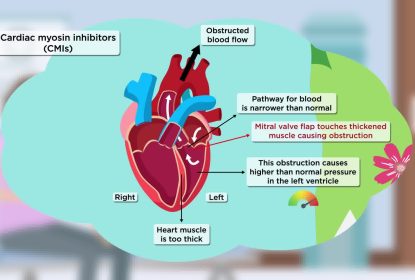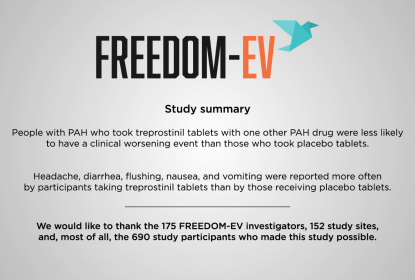
VOLTAIRE-RA and VOLTAIRE-RA extension: Clinical equivalence studies of BI 695501 (Cyltezo®; adalimumab-adbm) and adalimumab reference product in rheumatoid arthritis
In chronic inflammatory diseases such as rheumatoid arthritis, a protein called TNF is overproduced in the affected part of the body. This causes inflammation and damage. Adalimumab, a type of drug known as a biologic, is used to treat these conditions by blocking the action of TNF to reduce the inflammation.
The FDA defines a biosimilar as a biological product that is highly similar to and has no clinically meaningful differences in safety and effectiveness to an existing FDA-approved reference product. This means that there are more treatment options for chronically ill patients at a potentially lower cost.
BI 695501 (Cyltezo®; adalimumab-adbm) is an adalimumab biosimilar that has demonstrated similar efficacy, safety, and immunogenicity to adalimumab reference product (Humira®; adalimumab RP) in patients with Crohn’s disease and chronic plaque psoriasis.
In this video, Professor Stanley Cohen (Department of Internal Medicine, Metroplex Clinical Research Center, in Dallas, Texas) discusses the VOLTAIRE-RA and VOLTAIRE-RA extension studies, which aimed to compare the biosimilar adalimumab, BI 695501 (Cyltezo®; adalimumab-adbm), with the reference product (Humira®; adalimumab RP) in a clinical population with active rheumatoid arthritis.
Original articles:
Similar efficacy, safety, and immunogenicity of adalimumab biosimilar BI 695501 and Humira reference product in patients with moderately to severely active rheumatoid arthritis: results from the phase III randomised VOLTAIRE-RA equivalence study.
Cohen SB, Alonso-Ruiz A, Klimiuk PA et al.
Annals of the Rheumatic Diseases (2018) doi.org/10.1136/annrheumdis-2017-212245.
Long-term safety, efficacy, and immunogenicity of adalimumab biosimilar BI 695501 and adalimumab reference product in patients with moderately-to-severely active rheumatoid arthritis: results from a phase 3b extension study (VOLTAIRE-RAext).
Cohen SB, Czeloth N, Lee E, Klimiuk PA, Peter N & Jayadeva G.
Expert Opinion on Biological Therapy (2019) doi.org/10.1080/14712598.2019.1645114.
Meet the speaker:  Dr. Stanley Cohen is a board-certified rheumatologist and internist at Rheumatology Associates in Dallas, Texas (since 1975). Dr. Cohen is a Clinical Professor in the Department of Internal Medicine at UT Southwestern Medical Center and Co-Director of the Division of Rheumatology at Presbyterian Hospital, Dallas. He is also Co-Medical Director of Metroplex Clinical Research Center. He is a past president of the American College of Rheumatology and was honored in 2016 with the designation of Master by the American College of Rheumatology.
Dr. Stanley Cohen is a board-certified rheumatologist and internist at Rheumatology Associates in Dallas, Texas (since 1975). Dr. Cohen is a Clinical Professor in the Department of Internal Medicine at UT Southwestern Medical Center and Co-Director of the Division of Rheumatology at Presbyterian Hospital, Dallas. He is also Co-Medical Director of Metroplex Clinical Research Center. He is a past president of the American College of Rheumatology and was honored in 2016 with the designation of Master by the American College of Rheumatology.
Dr. Cohen completed a degree in biology from the University of Virginia and received his Doctor of Medicine with honors, from the University of Alabama School of Medicine in Birmingham. He completed an internship and residency in Internal Medicine at Parkland Memorial Hospital, Dallas, Texas, and a fellowship in Rheumatology at UT Southwestern/St. Paul University Hospital.



